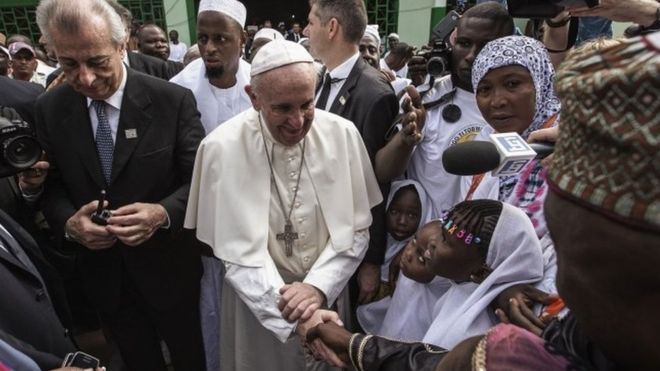-
Tips for becoming a good boxer - November 6, 2020
-
7 expert tips for making your hens night a memorable one - November 6, 2020
-
5 reasons to host your Christmas party on a cruise boat - November 6, 2020
-
What to do when you’re charged with a crime - November 6, 2020
-
Should you get one or multiple dogs? Here’s all you need to know - November 3, 2020
-
A Guide: How to Build Your Very Own Magic Mirror - February 14, 2019
-
Our Top Inspirational Baseball Stars - November 24, 2018
-
Five Tech Tools That Will Help You Turn Your Blog into a Business - November 24, 2018
-
How to Indulge on Vacation without Expanding Your Waist - November 9, 2018
-
5 Strategies for Businesses to Appeal to Today’s Increasingly Mobile-Crazed Customers - November 9, 2018
Pope meets Muslims in war-torn African city
Pope Francis made a historic visit to the last remaining Muslim neighborhood in Central African Republic’s capital Monday, a move that nearly immediately opened up a part of the divided city troubled for months by retaliatory violence between Muslim and Christian militias.
Advertisement
There, on the final leg of his first trip to Africa, the leader of the world’s 1.2 billion Catholics called on Christian and Muslim “brothers and sisters” to end the sectarian conflict that has torn the country apart.
On a rare trip into the volatile neighborhood known as PK5, the pope recalled Monday how Christians and Muslims had long lived together peacefully in Bangui.
In the wake of violence between Christians and Muslims in the country, Pope Francis today prayed with an Imam during a visit to the Grand Mosque of Koudoukou in Bangui, Central African Republic.
Recalling the upcoming national consultations, the Holy Father said, “We can not fail to express hope that the forthcoming national consultations will provide the country with leaders capable of bringing Central Africans together, thus becoming symbols of national unity rather than merely representatives of one or another faction”.
President Francois Bozize was ousted in a coup in March 2013 and a group of mostly muslim rebels from the north, the Seleka, marched on Bangui, briefly taking control of the country.
At the Central Mosque, Pope Francis removed his shoes, bowed his head and stood silently at the mihrab, or area of the mosque that faces Mecca.
Francis visited Kenya, Uganda and the Central African Republic during his trip.
Violence continued until the morning Francis took off for PK-5, the Muslim enclave that has dwindled from 122,000 to 15,000 inhabitants in two years because of militia assaults.
According to the BBC correspondent who was traveling with the pope Francis made such an impact that Muslim rebels attended a Mass he gave, and after his visit some wore T-shirts adorned with the pope’s picture. In two years of war, more than 6,000 people have been killed, mostly along religious lines.
Pope Francis, on his way home from Africa, has admitted that the question of allowing condom use to prevent the spread of HIV is “complicated” for the Roman Catholic Church but he also said there are larger problems to address.
“The first, which is widely considered the first genocide of the twentieth century, struck your own Armenian people”, he said, quoting a declaration signed in 2001 by Pope John Paul II and Karekin II, Catholicos of All Armenians.
Rebel leader Michel Djotodia resigned the presidency previous year to make way for an interim government, headed by interim President Catherine Samba-Panza, but violence continues.
Pope Francis said his visit to the nation “would not be complete if it did not include this encounter with the Muslim community”, saying all those who believed in God “must be men and women of peace”. Earlier the French defense ministry warned that he should not go, and even the security forces in C.A.R. said they could not guarantee the pontiff’s safety, which would have surely tested even this pope’s faith.
The Mass was followed by a brief farewell ceremony at Bangui airport, before the papal plane took off for Rome.
“Our world has a grave social debt toward the poor who lack access to drinking water, because they are denied the right to a life consistent with their inalienable dignity”.
The Central African Republic, rich in natural resources, can and must do more to develop job opportunities, but must work with local and global organizations and businesses to ensure that the use of natural resources does not become an abuse of them. Before arriving, he also visited Kenya and Uganda.
Advertisement
“I don’t think the groups are going to disarm just because the pope calls for it”, said Mudge from Human Rights Watch.





























